FW
Tantu’s recent seminar in New Delhi, was dedicated to highlighting the problems in jeans manufacturing and market and to creatively suggest effective solutions in the key areas.
One panel discussion was on jeans manufacturing. Most panelists agreed jeans manufacturing might have been a science 20 years back but is more of an art now, where it starts with conceptualizing the likes and dislikes of the customer into a design and this art is backed by scientific innovation. The forum also discussed the popularity of striped denim. It was observed that there is a demand for striped denim, but due to complications in its manufacturing it is more costly. However, it was observed, the real challenge lies in producing checked denim as indigo dyed weft yarn does not lend itself to denim wash and the resultant look is not very appealing.
Tantu seminars serve the purpose of bridging the gap between problem experienced and solutions. It stands as a platform to take up the issues and has experts from various backgrounds deliberate over the cause and effects of such issues in the industry. Unlike most forums, Tantu believes a panel discussion is the right way to confront the problems and deduce solutions.
Lycra has launched EcoMade, its first branded elastane made with pre-consumer content. The EcoMade family of recycled products now spans the majority of Lycra’s apparel brands, including Lycra, Lycra T400, Coolmax, and Thermolite.
Lycra’s platform focuses on providing insights, technologies, products, and processes that can contribute to a more sustainable industry. Through the pillars of product sustainability, manufacturing excellence, and corporate responsibility, Lycra offers a variety of sustainable solutions focused on waste reduction, safe and transparent chemical use, garment wear life, and sustainable resources. The company plans to convert the majority of Coolmax and Thermolite fiber products to recycled content by the end of 2021. Lycra’s latest spandex/elastane innovation for the global personal care industry called HyFit T859 offers manufacturers of diapers, adult incontinence and feminine hygiene products significant cost savings. The fiber cuts overall elastic consumption by 20 per cent. The fiber was developed to help manufacturers reduce their operating costs and carbon footprint without sacrificing a garment’s quality or performance, or the consumer’s wearing experience.
Lycra is an innovator and producer of fiber and technology solutions for apparel and hygiene industries and specialty chemicals. Based in the US, the company owns brands like Lycra, Coolmax, Thermolite, Elaspan, Supplex, Tactel, and Terathane. Lycra invented the original spandex yarn, Lycra fiber.
Innovation is infiltrating cotton design. Once seen as a casual classic, cotton is a staple material that is now taking on a new life in high fashion. Cotton has evolved from tried-and-true classic staples like T-shirts and denim jeans. The cotton garments now seen on runways range from silky-smooth coral crochet dresses, ethereal peach gowns studded with futuristic 3D flowers and black-and-white poplin turned into avant-garde jumpsuits. It’s this innovation in design that is transforming cotton in inspiring ways.
Cotton is a fiber that everybody wants to wear, so everybody’s working to make it useful in many different ways beyond T-shirts and jeans. At a recent show, designers used US cotton in such unexpected ways that the garments displayed were actually mistaken for silk, suede and synthetic fibers. Designers dyed cotton in the sun, scalloped it, shredded it and turned it into velvet, while one particular designer even interlocked cotton fabric without traditional sewing so that the garment could be taken apart and the pieces could be reconstructed into a whole new style.
Cotton is an effortless fabric made from a natural fiber that was grown from a plant, that’s able to morph into a garment that has the performance capabilities of synthetic fibers, or the artistic elements of haute couture.
Imports of textile machinery in India grew 1.10 per cent in the first quarter. India imports most of its textile machinery from China, Germany, Japan, Belgium, US, Korea and Vietnam.
Import of weaving machines from China grew 8.4 per cent; import of weaving machines from Belgium grew 94.86 per cent. Printing machinery imports from China grew 12.69 per cent. Import of knitting, embroidery, trimming, braiding and other machines increased 23.49 per cent in the first quarter. Nonwoven machinery imports grew by 468.71 per cent. Imports from Germany rose by 3315.58 per cent. China’s exports of nonwoven machinery to India grew by 37.06 per cent. Sewing machinery and accessories imports to India rose by 1.4 per cent in the first quarter. Here imports from China grew by 12.1 per cent in the first quarter.
Indian imports of dobbies and jacquards fell by 25.73 per cent. Spindles, spindles flyers and spinning rings and ring travelers imports fell by 13.11 per cent. Imports of machine used for extruding, drawing and texturing fell 75.48 per cent.
China remains the top supplier to India for textile machinery. Germany is the second largest supplier of textile machines to India. Singapore has now become the third largest supplier.
As cotton prices are expected to fall after Diwali, government-run Cotton Corporation of India (CCI) plans to buy as many as 100 lakh bales of the fibre from farmers during 2019-20 cotton season. Currently, arrivals were negligible and did not meet the quality parameters of the agency of 12 per cent moisture. CCI buys cotton from farmers whenever prices fall below the minimum buying price set by the government. The corporation would buy cotton at MSP if their prices fall below the support price. Currently, prices are above the MSP at Rs 5,900 per quintal in North India, where fresh crop has started arriving. The MSP of cotton for the 2019-20 season is Rs 5,550 per quintal, against Rs 5,450 in the previous year.
Though the cotton bales have started arriving in Madhya Pradesh, CCI would not be able to buy them as their moisture content levels are high. The corporation has established 358 procurement centres this year and will open more if required
Stocks of greasy wool are running low in China. On the other hand there is an oversupply of woolen fabrics. Fashion trends for the coming winter in China would determine whether demand will clear the fabric backlog and whether the innovative double-faced fabrics in particular, which use a lot of short wools, feature as a fashion statement for winter. When double-faced fabrics became popular, everyone starting making it, including a lot of low quality mills.
There is an oversupply of finished knitwear and wool garments in China. Women's reversible winter fashion coats are popular in China. Volatility is hurting the industry in all areas - from fabric makers to woolgrowers. The trade war between the United States and China set it off and confidence disappeared quickly. Wool wasn't being absorbed as much into new product, into blends, because it was considered too expensive. Exports of processed wool product out of China are down five per cent year on year and domestic wool sales are down 6.2 per cent year on year.
There’s too much fine wool on the market. Woolgrowers are not producing the basic 21 and 22 micron wools. This could mean that wool will be replaced in the market by synthetics.
Debasish Das, Professor, University of Calcutta, Department of Jute and Fibre Technology, and Subhas Ghosh, Professor, Eastern Michigan University, School of Visual Built Environments, College of Engineering and Technology, have won the 2019 Discover Natural Fibers Initiative Innovation Award.
The two researchers were awarded for their development of a biodegradable cotton-jute fabric with a waterproof coating that can substitute for non-biodegradable PVC-coated polyester. The new cotton-jute fabric is suitable for use in outdoor fabrics such as tarps, awnings, canopies, or automobile hooding material. In addition to being biodegradable, the natural fiber material meets fire-retardancy standards and allows the transfer of moisture vapor to avoid the accumulation of humidity on the underside of fabrics, while remaining waterproof. Crucially, the natural fiber textile product developed by Das and Ghosh contains no carcinogenic plasticiser, no toxic formaldehyde-based adhesion promoter, and no non-biodegradable fabric components.
This cost-effective natural fiber product was developed within the Department of Jute and Fiber Technology, University of Calcutta, with support from the Ministry of Textiles, Government of India. The product will be produced on a commercial scale by Ajanta Textiles, India.
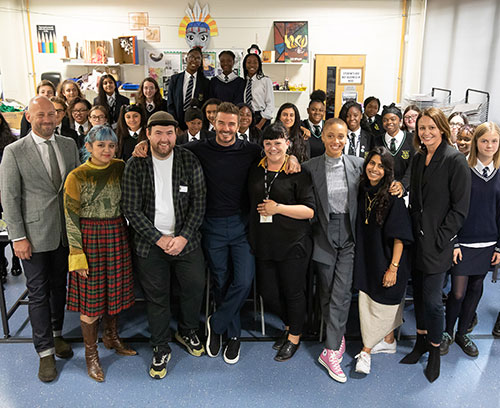 The British Fashion Council (BFC) launched its fashion studio apprenticeship alongwith BFC Chief Executive Caroline Rush, BFC Ambassadorial President David Beckham and BFC Ambassador for Positive Fashion Adwoa Aboah.
The British Fashion Council (BFC) launched its fashion studio apprenticeship alongwith BFC Chief Executive Caroline Rush, BFC Ambassadorial President David Beckham and BFC Ambassador for Positive Fashion Adwoa Aboah.
The Fashion Studio Apprenticeship is part of the BFC’s education department which gives young people a clear understanding of how to train for a plethora of industry roles within the creative industries.
Designed by a group of fashion employers, with the BFC, the apprenticeship starts at the studio and features the entire creation of a collection. The Fashion Studio Assistant is a key position in the designer industry, working with the team that creates a collection. For the first six months, the apprentice will complete a foundation which will include core elements of the job role such as critical path management and health & safety measure. This will lead to 12 months in a more focused area of the business, with the apprentice choosing to specialise in one of three pathways:
• Product Development and Production
• Sales and Operations
• Fashion Marketing and Communications
Following on from the 18-month training the apprentice will undertake an Independent End-Point Assessment that has been derived by industry experts in this field. The assessment will be taken in 2 steps:
• Work Based Project (Including Presentation and Discussion)
• Practical Test The grades for both elements will be combined to confirm the overall achievement of Fail, Pass or Distinction.
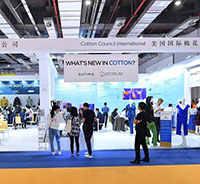 Cotton USA showcased its latest innovations in smart fashion at its booths in both Intertextile Shanghai Apparel Fabrics and Yarn Expo.
Cotton USA showcased its latest innovations in smart fashion at its booths in both Intertextile Shanghai Apparel Fabrics and Yarn Expo.
At both these shows, Cotton USA™ highlighted U.S. cotton’s sustainability, quality, transparency and premium value, as well as the findings of current market and consumer studies and its ongoing Sourcing Programs that match U.S. cotton buyers and suppliers throughout the supply chain.
Visitors to the booths also learned about how becoming a Cotton USA™ licensee will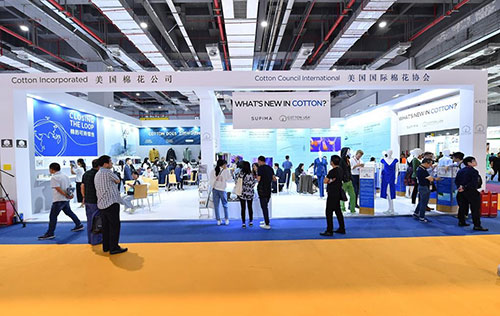 benefit their businesses. Quantitative consumer research proves that the Cotton USA™ Mark is of high value to consumers and can drive both preference and higher prices. In addition, Cotton USA highlighted six licensees at the booth–Color Denim, Huafu, Laws Group, Ningbo Guangyuan, SCHIESSER and Zibo Lanyan–showcasing high quality knitted and woven fabrics and garments.
benefit their businesses. Quantitative consumer research proves that the Cotton USA™ Mark is of high value to consumers and can drive both preference and higher prices. In addition, Cotton USA highlighted six licensees at the booth–Color Denim, Huafu, Laws Group, Ningbo Guangyuan, SCHIESSER and Zibo Lanyan–showcasing high quality knitted and woven fabrics and garments.
This year’s the Intertextile Shanghai Apparel Fabrics show had more than 4,400 exhibitors from 33 countries to feature a full range of textile products, and it attracted nearly 89,662 visitors from over 120 countries & regions to the three-day-show.
"The autumn edition of CHIC Shanghai from 25 to 27 September 2019 ended on a successful note. The exhibition recorded 698 exhibitors and 718 brands from 10 countries and 54,202 trade visitors. The exhibitors displayed their new collections on 62,000 square meters at the National Exhibition & Convention Center. CHIC is owned by Beijing Fashion Expo Co and China World Exhibitions, supported by the China National Garment Association, the Sub-Council of the Textile Industry (CCPIT) and the China World Trade Center."
The autumn edition of CHIC Shanghai from 25 to 27 September 2019 ended on a successful note. The exhibition recorded 698 exhibitors and 718 brands from 10 countries and 54,202 trade visitors. The exhibitors displayed their new collections on 62,000 square meters at the National Exhibition & Convention Center. CHIC is owned by Beijing Fashion Expo Co and China World Exhibitions, supported by the China National Garment Association, the Sub-Council of the Textile Industry (CCPIT) and the China World Trade Center.
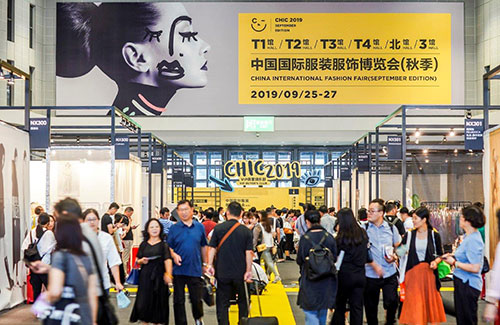
Ten clearly structured trade fair segments showcased the entire spectrum of fashion and lifestyle at the CHIC exhibition. These segments included New Look (Womenswear), Impulses (Designer), Urban View (Menswear), Chic Tailoring (Bespoke), Heritage (Leather and Fur), Chic Kidz, Chic Young Blood (Young Up-And-Coming Streetwear Labels), Secret Stars (Accessories), Bags & Shoes and Future Link (Innovative Developments For The Fashion Industry).
Focus on bespoke fashion
The New Look segment featured around 80 exhibitors who were mainly womens wear brands. The segment featured renowned exhibitors such as Jore Baudry.
Menswear featured prominently in the Chic Tailoring segment which showcased classic men's fashion, smart casuals with a growing denim component and bespoke collections. Solosali, one of the most popular Bespoke labels in China, received a great deal of attention in this segment
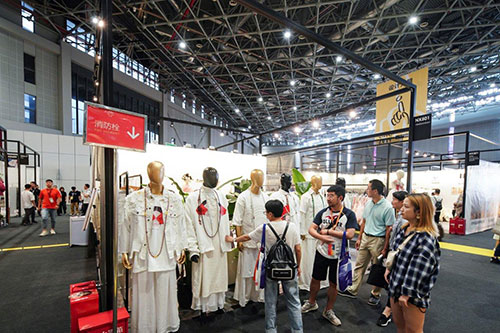
Launch of new label at Impulses
Impulses, the design department of CHIC, showcased designers such as Feng Sansan who presented his current collections for women, men and children with traditional Chinese elements. Designer Maggie Ma used the platform to launch her label Maggie Ma which is aimed at the younger target group. Further highlights for the visitors of Impulses were MAO MART homme, exclusive designer collection for women and Wei Jianfei, winner of the CHIC Market Potential Award.
In the Fashion Journey international section, the Korean show-in show Preview in China with 38 brands organised by the Korean Federation of Textile Industries (KOFOTI) presented their satisfaction with the professionalism of the CHIC exhibition platform.
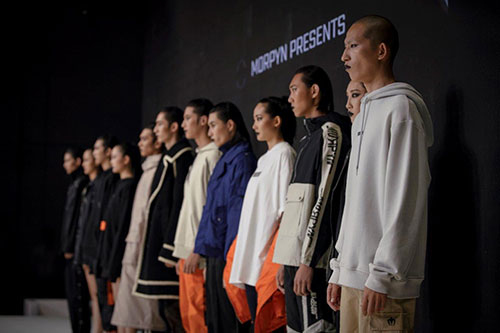
Positive response for leather and fur collections
The leather and fur collections of the ten participants in the Hong Kong Fur Association Pavilion met with a positive response from agents and wholesalers from all over China, even distributors of luxury brands were interested in future collaborations.
Spotlight on Poland
The Polish brands Kids on the Moon and booso used CHIC KIDZ as an entry point into the Chinese consumer market, as did Mimozah Kids from Canada. Mishka Matreshka from Laboratory in Russia also took the first step to China as part of CHIC and received very positive feedback from potential business partners with the manga style of their shirts.
In the area of CHIC Bags & Shoes, Glamoursy from Poland presented an exclusive shoe collection and so did the young shoe and bag label Inyati from Germany.
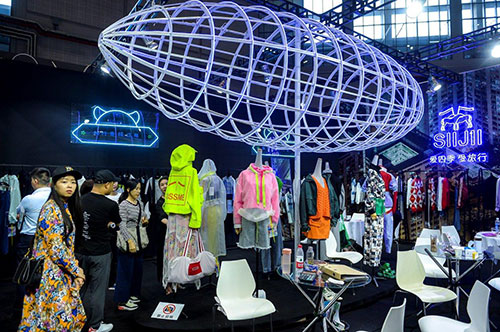
Industry topics at Chic Talk
The Chic Talk which deliberated on topics such as ‘E-Marketing in Social Networks’, ‘Responsible Development Conference and Integration of Industry and Banks in the Chinese Textile and Apparel Industry’, ‘Digital Traffic, Reshaping Retail - Omni Channel Digital Innovation Forum’, WGSN's Trend Preview The theme "A / W 20/21 Women's Wear Forecast & Buyers" and the opening ceremony of the Lining Cup, was well attended by visitors and exhibitors alike.












